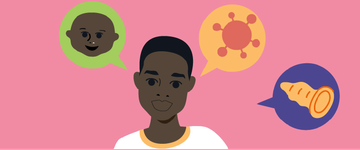All about HIV
What is HIV?
HIV stands for Human Immunodeficiency Virus. It’s a virus that attacks the body’s immune system, making it harder and harder to fight infections.
What is AIDS?
HIV and AIDS are different. Without treatment, HIV can seriously damage the body’s immune system and make it too weak to be able to fight off infections. This is called AIDS, which stands for Acquired Immune Deficiency Syndrome. AIDS is a set of illnesses caused by HIV. Now that more people are taking treatment for HIV, less people die from AIDS.
How do you get HIV?
You can’t ‘catch’ HIV, like you can catch a cold. HIV is only passed on through 4 bodily fluids:
- Blood
- Semen
- Vaginal fluids
- Breastmilk
Most people get HIV by having unprotected sex (sex without a condom).
The only way to know if you have HIV is by getting a test. You can’t tell just by looking at someone if they have HIV. Many people with HIV don't have any symptoms, especially if they are taking treatment.
How can you prevent HIV?
There are lots of things that you can do to prevent HIV:
- Use condoms every time you have sex.
- Don’t share needles, syringes and other injecting equipment.
- If you are living with HIV, taking HIV treatment can help to prevent passing HIV on to other people, including an unborn baby if you are pregnant.
- In some places, HIV drugs are available that can be taken before and after sex to prevent HIV infection. These are called PrEP (short for pre-exposure prophylaxis) and PEP (post-exposure prophylaxis).
To learn more, check out these resources:
Average Rating: ★ ★ ☆ ☆ ☆ (15 reviews)
Leave Your Feedback
Recent Reviews
When doing sex without condom you can be pregnant and you can have HIV and AIDS,not only by doing sex and also by touch someone's blood.To avoid it you must use condoms everytime you have sex
July 4, 2025, 5:48 a.m.What if I sleept unprotected sex
July 1, 2025, 10:11 a.m.

